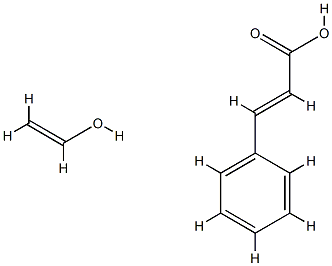Poly(ethyl vinyl ether)
Synonym(s):Ethyl vinyl ether homopolymer;Vinyl ethyl ether polymer
- CAS NO.:25104-37-4
- Empirical Formula: C4H8O
- Molecular Weight: 72.11
- MDL number: MFCD00084462
- EINECS: 680-545-4
- SAFETY DATA SHEET (SDS)
- Update Date: 2024-12-18 13:37:16

What is Poly(ethyl vinyl ether) ?
Chemical properties
Poly(ethyl vinyl ether) is a opaque amber viscous liquid, It is a hydrophobic material that is insoluble in water or other polar solvents.
The Uses of Poly(ethyl vinyl ether)
Poly(ethyl vinyl ether) can used as a plasticiser for cellulose nitrate and cellulose resin lacquers, as a base for pressure-sensitive adhesives in films and tapes, especially in surgical applications. Also used for non-irritating surgical casts requiring moisture permeability and to impart dry-film flexibility and increased viscosity of photochemical resist-coating compositions.
Preparation
To a flask containing 200 gm of benzene is added 1.0 gm of aluminum chloride. The mixture is stirred vigorously to suspend the catalyst and then the gradual addition of 200 gm (2.78 moles) of vinyl ether is begun. The reaction is exothermic, and when the temperature rises to 60°-80°C the addition is slowed so that only 1-2 gm of vinyl ethyl ether is added at one time. Polymerization is detected by the onset of turbidity and a slight brown color. When the brown color disappears, the next increment of vinyl ethyl ether is added. After the complete addition the reaction mixture is heated to 80°C. The benzene and volatiles are steam-distilled off, and the residue amounts to about 144 gm (72%) of a yellow balsamlike product.

Preparation of Poly(vinyl ethyl ether) Using Aluminum Chloride Catalyst
Hazard
Moderately toxic.
Safety Profile
Moderately toxic by intraperitoneal route. When heated to decomposition it emits acrid smoke and irritating vapors.
Properties of Poly(ethyl vinyl ether)
| Density | 0.968 g/mL at 25 °C (lit.) |
| vapor pressure | 22.5 mm Hg ( 20 °C) |
| refractive index | n |
| InChI | InChI=1S/C4H8O/c1-3-5-4-2/h3H,1,4H2,2H3 |
| CAS DataBase Reference | 25104-37-4 |
| EPA Substance Registry System | Poly(vinyl ethyl ether) (25104-37-4) |
Safety information for Poly(ethyl vinyl ether)
Computed Descriptors for Poly(ethyl vinyl ether)
| InChIKey | FJKIXWOMBXYWOQ-UHFFFAOYSA-N |
| SMILES | O(C=C)CC |
New Products
Tert-butyl bis(2-chloroethyl)carbamate (S)-3-Aminobutanenitrile hydrochloride N-Boc-D-alaninol N-BOC-D/L-ALANINOL N-octanoyl benzotriazole 3,4-Dibenzyloxybenzaldehyde 4-Hydrazinobenzoic acid 1,1’-CARBONYLDIIMIDAZOLE R-2-BENZYLOXY PROPIONIC ACID 4-HYDROXY BENZYL ALCOHOL 1,1’-CARBONYLDI (1,2-4 TRIAZOLE) 3-NITRO-2-METHYL ANILINE (2-Hydroxyphenyl)acetonitrile 4-Bromopyrazole 5-BROMO-2CYANO PYRIDINE 5,6-Dimethoxyindanone 5-broMo-2-chloro-N-cyclopentylpyriMidin-4-aMine 2-(Cyanocyclohexyl)acetic acid 4-methoxy-3,5-dinitropyridine 2-aminopropyl benzoate hydrochloride 1-(4-(aminomethyl)benzyl)urea hydrochloride tert-butyl 4- (ureidomethyl)benzylcarbamate diethyl 2-(2-((tertbutoxycarbonyl)amino) ethyl)malonate Ethyl-2-chloro((4-methoxyphenyl)hydrazono)acetateRelated products of tetrahydrofuran








You may like
-
 Poly(ethyl vinyl ether) CAS 25104-37-4View Details
Poly(ethyl vinyl ether) CAS 25104-37-4View Details
25104-37-4 -
 55441-95-7 99%View Details
55441-95-7 99%View Details
55441-95-7 -
 N-Vinylformamide 99%View Details
N-Vinylformamide 99%View Details
13162-05-5 -
 Chloro Uracil 1820-81-1 99%View Details
Chloro Uracil 1820-81-1 99%View Details
1820-81-1 -
 207557-35-5 99%View Details
207557-35-5 99%View Details
207557-35-5 -
 2-ethyl-6-methyl-3-hydroxypyridine succinate 99%View Details
2-ethyl-6-methyl-3-hydroxypyridine succinate 99%View Details
127464-43-1 -
 2-ETHYLPYRIDINE 100-71-0 99%View Details
2-ETHYLPYRIDINE 100-71-0 99%View Details
100-71-0 -
 181228-33-1 (S)-Methyl 3-amino-2-((tert-butoxycarbonyl)amino)propanote Hydrochloride (DAP-OMe. HCl) 99%View Details
181228-33-1 (S)-Methyl 3-amino-2-((tert-butoxycarbonyl)amino)propanote Hydrochloride (DAP-OMe. HCl) 99%View Details
181228-33-1